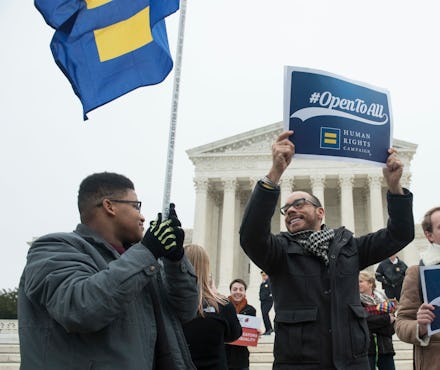Supreme Court rules in favor of Colorado baker who refused to make cake for gay couple

The Supreme Court on Monday narrowly sided with a Colorado baker who refused to make a wedding cake for a gay couple, citing religious objections to same-sex marriage.
The case focuses on what it calls “hostility” from the Colorado Civil Rights Commission, which initially ruled against Jack Phillips, the baker at Masterpiece Cakeshop in Lakewood, Colorado, who refused to bake a cake for a same-sex couple for their wedding back in 2012.
In a 7-2 decision written by Justice Anthony Kennedy, the court ruled the Colorado Civil Rights Commission “showed elements of a clear and impermissible hostility toward the sincere religious beliefs motivating his objection.”
“When the Colorado Civil Rights Commission considered this case, it did not do so with the religious neutrality that the Constitution requires,” Kennedy wrote in the decision, saying that the “commission’s hostility was inconsistent with the First Amendment’s guarantee that our laws be applied in a manner that is neutral toward religion.”
The decision isn’t a total loss for the LGBTQ communities. The decision doesn’t say that any store owner can refuse to sell things to people on religious grounds. It merely says that Phillips, the cake maker, “was entitled to a neutral and respectful consideration of his claims in all the circumstances of the case.”
“As the record shows, some of the commissioners at the commission’s formal, public hearings endorsed the view that religious beliefs cannot legitimately be carried into the public sphere or commercial domain, disparaged Phillips’ faith as despicable and characterized it as merely rhetorical, and compared his invocation of his sincerely held religious beliefs to defenses of slavery and the Holocaust,” Kennedy wrote in his decision.
“The government, consistent with the Constitution’s guarantee of free exercise, cannot impose regulations that are hostile to the religious beliefs of affected citizens and cannot act in a manner that passes judgment upon or presupposes the illegitimacy of religious beliefs and practices,” Kennedy added.
“As this court has long held, and reaffirms today, a vendor cannot escape a public accommodations law because his religion disapproves selling a product to a group of customers, whether defined by sexual orientation, race, sex or other protected trait,” Kagan wrote.
“A vendor can choose the products he sells, but not the customers he serves — no matter the reason,” Kagan added. “Phillips sells wedding cakes. As to that product, he unlawfully discriminates: He sells it to opposite-sex but not to same-sex couples.”
Monday, June 4, 2018: 11:29 a.m.: This story has been updated.